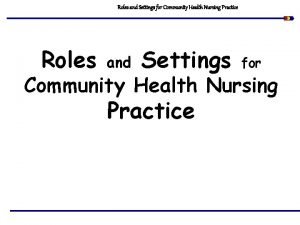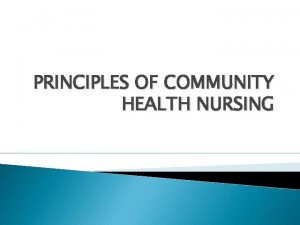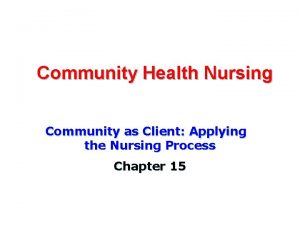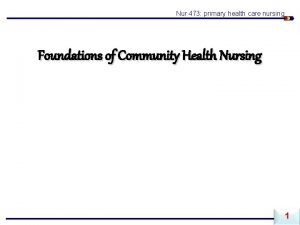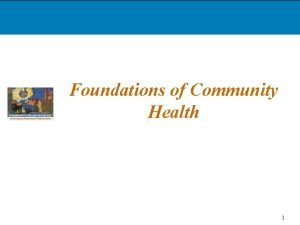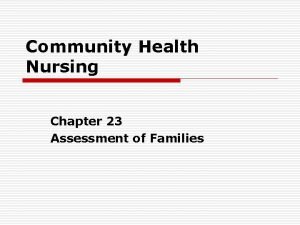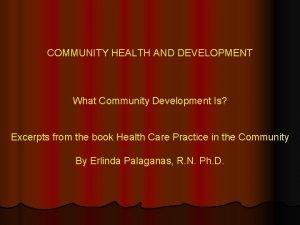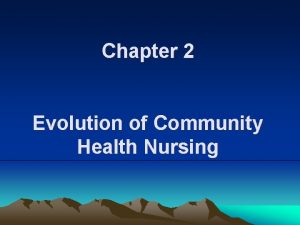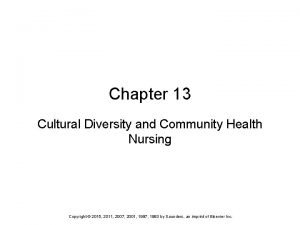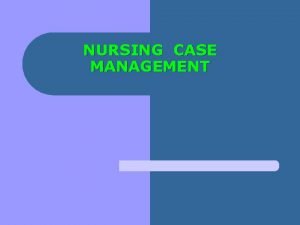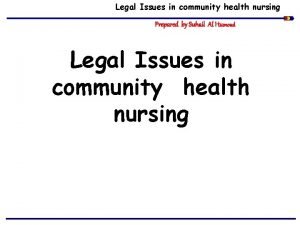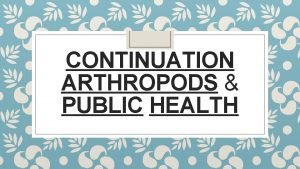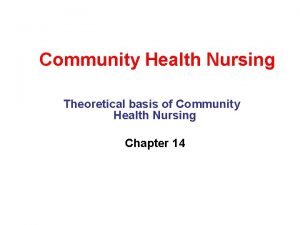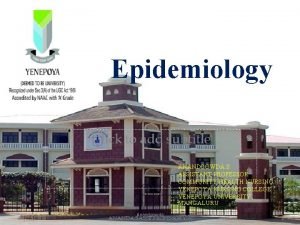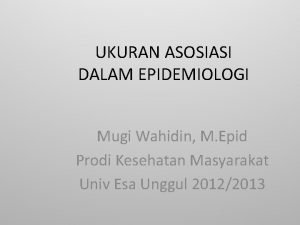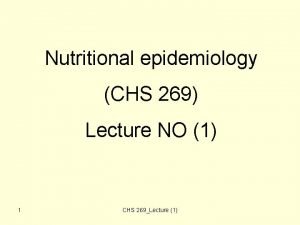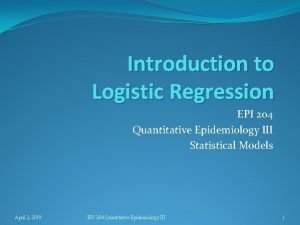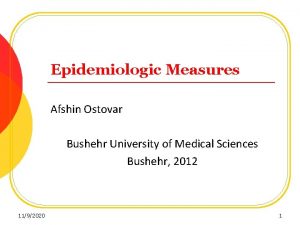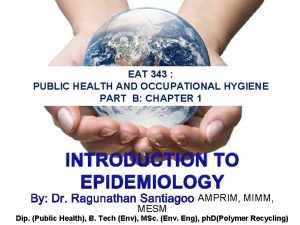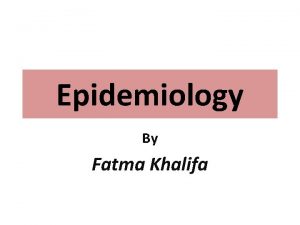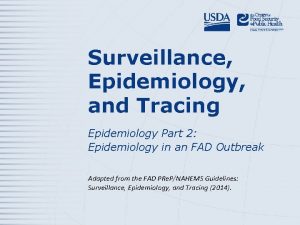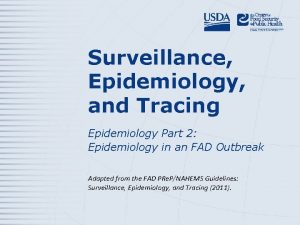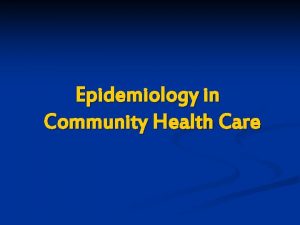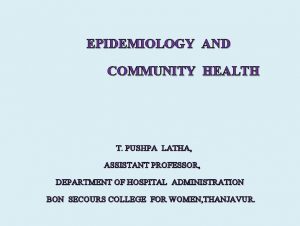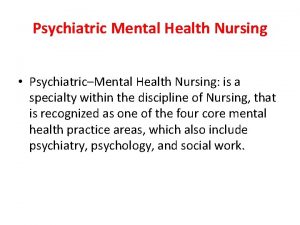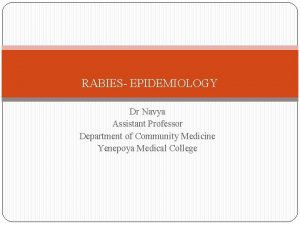Epidemiology ANANDGOWDA S ASSISTANT PROFESSOR COMMUNITY HEALTH NURSING











































- Slides: 43

Epidemiology ANANDGOWDA. S ASSISTANT PROFESSOR COMMUNITY HEALTH NURSING YENEPOYA NURSING COLLEGE YENEPOYA UNIVERSITY , MANGALURU Anandgowda

LEARNING OBJECTIVES At the end of the class the student will be able to- Ødefine epidemiology Øunderstand the concept of epidemiology Ø understand the aim and scope of epidemiology Ø define common terminologies used in epidemiology

INTRODUCTION • Epidemiology is the basic science of Preventive and Social Medicine. • Epidemiology is scientific discipline of public health to study diseases in the community to acquire knowledge for health care of the society. (prevention, control and treatment).

• Epidemiological principles and methods are applied in – - Clinical research, - Disease prevention, - Health promotion, - Health protection and - Health services research.

MEANING • Epidemiology is a compound of three Greek words epi-------among demos-----People logos-----Study/science Epidemiology is a study of events that occur among people. Epidemiology is a study of disease in human population

Definition “The study of the distribution and determinants of health-related states or events in specified populations, and the application of this study to the prevention and control of health problems”. --- John M. Last(1988)


Other definitions • The study of the distribution and determinants of disease frequency in man ( Mac Mohon) • Epidemiology is branch of medical sciences which treats of epidemics ( Parkin)

Aim of Epidemiology (Acc. to International Epidemiological Association) 1. To describe the distribution and magnitude of health and disease problems in human population. 2. To identify etiological factors (risk factors) in the pathogenesis of disease. 3. To provide data essential to the planning, implementation and evaluation of services for the prevention, control and treatment of disease and setting priorities among those services.

Concept of epidemiology 1. Disease frequency. 2. Distribution of disease. 3. Determinants of disease.

Ultimate Aim of Epidemiology 1. To eliminate or reduce the health problems of community. 2. To promote the health and well-being of society as a whole.

SCOPE OF EPIDEMIOLOGY 1. Epidemiology has very wide scope, wider than what is normally conceives. Besides communicable & non-communicable diseases. The field of epidemiology covers all other health –related states and events such as alcoholism, drug abuse, accidents divorces, migrations etc. ,

2. Epidemiology studies the distribution of health related states and events. The distribution is viewed in three epidemiological dimensions of time, place and person. 3. Epidemiology studies the determinants of health related states and events. These determinants are identified by observing the distribution pattern of diseases and verifying cause-effect relationships.

TERMINOLOGY USED IN EPIDEMIOLOGY INFECTION The entry and development or multiplication of an infectious agent in the body of man or animals.

CONTAMINATION The presences of an infectious agent on a body surface; also on or in clothes, bedding, toys, surgical instruments or dressing, or other inanimate articles or substances including water, milk and food

INFESTATION For persons or animals the lodgement, development and reproduction of arthropods on the surface of the body or in the clothing.

HOST A person or other animal, including birds and arthropods, that affords subsistence or lodgement to an infectious agent under natural condition.

INFECTIOUS DISEASE A clinically manifest disease of man or animals resulting from an infection.

CONTAGIOUS DISEASE A disease that transmitted through contact. Eg: - scabies, trachoma, STD and leprosy

COMMUNICABLE DISEASE An illness due to a specific infectious agent or its toxic products capable of being directly or indirectly transmitted from man to man, animal to animal, or from the environment( through air, dust, soil, water, food etc) to man or animal.

Non communicable diseases • An illness which will not be transferred from one person to another.

Epidemic ( out break ) The “unusual” occurrence of disease or health related event in excess of “expected occurrence” in a region A large number of cases of a particular disease happening at the same time in a particular community. eg- Measles, Chickenpox and Cholera


ENDEMIC It refers to the constant presence of a disease or infectious agent within a given geographic area or population group. Eg- Hepatitis A, typhoid fever , Endemic goitre


SPORADIC The word sporadic means scattered about. The cases occur only occasionally or at intervals that are not regular. E. g. -polio, tetanus, herpes zoster and meningococcal meningitis


PANDEMIC An epidemic usually affecting a large proportion of the population, occurring over a wide geographic area such as section of a nation, entire nation, a continent or the world. e. g- Influenza , cholera and haemorrhagic conjunctivitis



EXOTIC Diseases which are imported into a country in which they do not otherwise occur.

ZOONOSES An infection or infectious disease transmissible under natural condition from vertebrate animals to man. e. g- Rabies, plague, bovine TB, anthrax, brucellosis, salmonellosis etc.

EPIZOOTIC An outbreak (epidemic) of disease in an animal population. e. g- Anthrax, Brucellosis, Rabies etc. .

EPORNITHIC An outbreak of disease in a bird population.

ENZOOTIC An endemic occurring in animals.

NOSOCOMIAL INFECTION Nosocomial (hospital acquired) infection is an infection originating in a patient while in a hospital or other health care facility. e. g-Hepatitis B, Urinary tract infection etc. .

OPPORTUNISTIC INFECTION This is infection by an organism that takes the opportunity provided by a defect in host defense to infect the host and hence cause disease. Very common in AIDS e. g– Herpes simplex, cytomegalovirus, toxoplasmosis, etc. . ,

IATROGENIC (PHYSICIAN-INDUCED) DISEASE Any untoward or adverse consequence of a preventive , diagnostic or therapeutic treatment or procedure, that causes impairment, handicap, disability or death resulting from a physician’s professional activity. Commonly in drug therapy, immunization or diagnostic procedure e. g- Reaction to penicillin, aplastic anemia following using chloramphenicol, childhood leukemia due to prenatal X-rays, Hepatitis B following blood transfusion etc….

SURVEILLANCE The continuous study of the factors that determine the occurrence and distribution of disease and other conditions of ill health. The main purpose of surveillance is to detect changes in trend or distribution in order to initiate investigate or control measures

Summary Anandgowda

Conclusion Anandgowda

EVALUATION • • Define epidemiology Define epidemic Define endemic Define pandemic Anandgowda

Reference • K. Park Community Health Nursing • Neelam Kumari Community Health Nursing • Thressiamma Community Health Nursing. Anandgowda
 How dr. wafaa elsadr epidemiology professor
How dr. wafaa elsadr epidemiology professor How dr. wafaa elsadr epidemiology professor
How dr. wafaa elsadr epidemiology professor Promotion from associate professor to professor
Promotion from associate professor to professor Cuhk assistant professor salary
Cuhk assistant professor salary Conclusion of 20 point programme
Conclusion of 20 point programme Nursing diagnosis three parts
Nursing diagnosis three parts Nursing diagnosis examples
Nursing diagnosis examples Roles of community health nursing
Roles of community health nursing Principles of chn
Principles of chn Collaborative nursing interventions
Collaborative nursing interventions Ineffective childbearing process example
Ineffective childbearing process example Nursing community diagnosis examples
Nursing community diagnosis examples Community health definition
Community health definition Historical development of community health
Historical development of community health Principle of home visit
Principle of home visit Component of community health nursing
Component of community health nursing Phases of home visit
Phases of home visit Component of community health nursing
Component of community health nursing Family care plan in community health nursing
Family care plan in community health nursing Why is community health important
Why is community health important Evolution of community health nursing
Evolution of community health nursing Chapter 13 cultural diversity and community health nursing
Chapter 13 cultural diversity and community health nursing Rch program definition
Rch program definition Function of community health nursing
Function of community health nursing Ethical and legal issues in community health nursing
Ethical and legal issues in community health nursing Arthropods in community health nursing
Arthropods in community health nursing Interrelated concepts nursing
Interrelated concepts nursing Ohn nurse meaning
Ohn nurse meaning Conclusion of community mental health nursing
Conclusion of community mental health nursing Epornithic
Epornithic Ethical and legal issues affecting the nursing assistant
Ethical and legal issues affecting the nursing assistant The nursing assistant and the care team chapter 2
The nursing assistant and the care team chapter 2 Chapter 2 foundations of resident care
Chapter 2 foundations of resident care Role and responsibility of occupational health nurse
Role and responsibility of occupational health nurse Kpu health care assistant
Kpu health care assistant Ukuran asosiasi adalah
Ukuran asosiasi adalah Advantages and disadvantages of nutritional epidemiology
Advantages and disadvantages of nutritional epidemiology Logistic regression epidemiology
Logistic regression epidemiology Formula for attack rate
Formula for attack rate Descriptive vs analytical epidemiology
Descriptive vs analytical epidemiology Formula for attack rate
Formula for attack rate Difference between descriptive and analytic epidemiology
Difference between descriptive and analytic epidemiology Epidemiology person place time
Epidemiology person place time Descriptive vs analytical epidemiology
Descriptive vs analytical epidemiology







